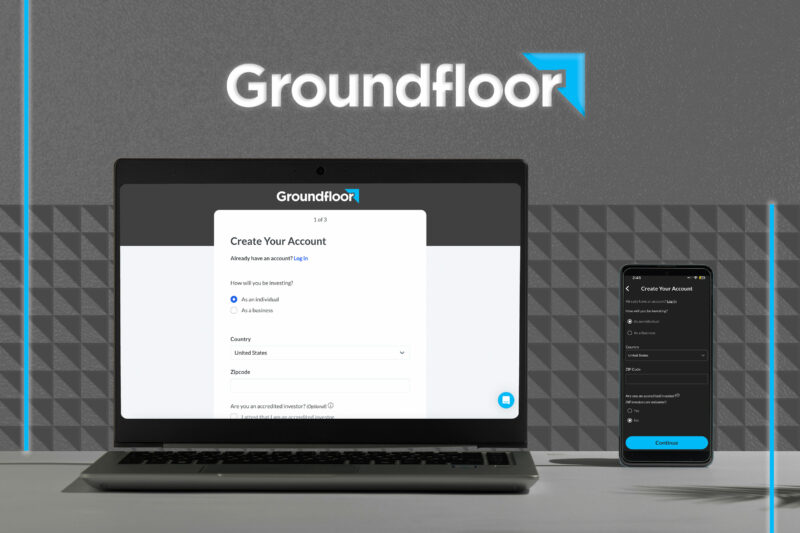
Product Name: Groundfloor
Product Description: Groundfloor allows non-accredited investors to participate in crowdfunding real estate loans for developers.
Summary
Groundfloor is a real estate investing platform that offers short-term, high-yield real estate investments. Investors can loan money to real estate developers for flips or new construction. Loans have terms between 12 and 18 months and historic average returns have been 10%. You can get started with as little as $10.
Overall
Pros
- Accreditation is not required.
- Loan investments are carefully screened to minimize risk.
- Start with as little as $10.
- No fees to investors.
Cons
- Funds are locked up for the duration of the loan.
- Risk of loan default.
Groundfloor provides loans to real estate developers for both renovation projects (flips) and new constructions. Loans are crowdfunded by investors. As an investor you can choose specific loans to fund or use the Autofund feature which will automatically invest in all available loans.
Loans range in terms from 12 to 18 months and your money is locked away for the lenght of the loan. Historical returns have averaged 10% and you can get started with as little as $10.
At a Glance
- Investors crowdfund loans for real estate projects.
- Loans have terms between 12 and 18 months.
- Invested funds are not available until the loan matures.
- Loans are in first position.
- Investors do not need to be accredited.
- Start with as little as $10.
- Choose your own investments, or automatically invest in all available loans.
- Historical returns have averaged 10%.
Who Should Invest with Groundfloor
Groundfloor is great for an investor who is looking to diversify by getting into debt products and is comfortable with real estate investing. While you are not investing directly into real estate, you are funding real estate projects and the success or failure of those projects will determine if the loans go into default.
Investors with Groundfloor also need to be ok with short term illiquidity, as the funds invested will not be accessible during the term of the loan. Although this can be mitigated by diversifying your investments over a large number of loans.
Groundfloor Alternatives
 | |||
| Minimum investment | $10 | $5,000 | 500 shares |
| Holding period | 3 months | 5 years | 1 year |
| Accreditation required | No | Yes | No |
| Learn more | Learn more | Learn more |
Table of Contents
- At a Glance
- Who Should Invest with Groundfloor
- Groundfloor Alternatives
- About Groundfloor
- Groundfloor for Individual Investors
- Groundfloor for House Flippers & Real Estate Developers
- Groundfloor Requirements and Features
- How to Sign Up with Groundfloor
- Should You Invest through Groundfloor?
- Groundfloor vs Fundrise
- Groundfloor vs EquityMultiple
- Groundfloor vs Streitwise
About Groundfloor
Groundfloor is a real estate investing platform that specializes in fractional real estate investments. The platform brings together real developers — who buy, flip, or build new properties — and investors who are looking for high returns on providing the loans that make those renovations possible.
As an investor, you help fund loans for real estate developers to renovate existing properties or build new. You earn interest on the loans and can pick and choose which loans you participate in or use the Auto Invest feature and invest in all available loans.
As a real estate developer, you can borrow between $75,000 and $750,000 for your next real estate project and there are no payments due until the loan matures. You can borrow money to either flip a property, or build new.
If you invest in these real estate projects, the company claims you can earn returns averaging 10%. That matches the performance of stocks, as measured by the S&P 500, and is many times higher than the best rates you can earn on safe, fixed-income investments, like certificates of deposit.
Groundfloor is based in Atlanta and began operations in 2013.
Groundfloor for Individual Investors
If you participate in Groundfloor as an investor, it will be strictly in the form of debt. You are lending a developer money, essentially acting as the bank.
The platform does allow for equity investments, but this is only for accredited investors with a Groundfloor Labs account. For most investors, you’ll be investing in short-term financing provided to entrepreneurs who purchase homes, renovate them, then sell them – or “flip” them – for profit. Others buy empty plots of land and construct new homes, then sell them for a profit.
This is one of the characteristics that makes Groundfloor different. With most real estate crowdfunding platforms, your investment will be tied up for several years until the underlying properties are sold. But since most are held for income, they may not be sold for several years. With Groundfloor, properties are bought, renovated or built, and sold quickly, so your investment will only be short-term.
Groundfloor is a platform where you can earn high returns without tying your money up for years at a time. It’s also open to everyone and offers no fees to invest.
Though the company advertises “We can nail down over 10% returns for you,” it’s actually possible to earn even more. 10% is the average.
Groundfloor works similar to peer-to-peer lending platforms, like Lending Club, in that the loans they make are at various risk rates. Lower risk loans carry lower interest rates, while higher risk loans provide higher returns. You can choose the “Auto Invest” feature which allows you to be automatically invested in all available loans, allowing you have built-in diversification and overall lower risk.
Though Groundfloor investments do involve risk, they have the advantage of being secured by the underlying real estate. And to help mitigate that risk, the company uses high underwriting standards, including industry-leading practices and a proprietary underwriting system. They even pre-fund most of their loans before making them available to investors.
Groundfloor also retains first lien position with its loans, to help lower the risks even further. If a borrow does go into default, the comapny works to find a solution for the investors and property owners, with foreclosure being a last resort.
Download the Groundfloor Mobile App
Groundfloor Investments
All property deals are subject to a thorough vetting process by Groundfloor, to determine the risk and expected return on each. Properties must ultimately be non-owner-occupied, and be limited to one to four-family homes, as Groundfloor investments do not include apartment buildings or commercial properties.
Each loan includes a description of the basic terms, such as the interest rate, the projected term, and loan-to-value (“ARV”). But notice that the loan-to-value is typically between 40% and 70% – that means the property flippers themselves have substantial cash investments in the property, which lowers your investment risk.
Your actual investment is in what is known as a limited recourse obligation, or LRO. It’s a debt security issued by Groundfloor, and qualified by the S.E.C. Once a property project is fully funded, you will purchase a portion of an LRO for a specified amount, starting with just $10.
By virtue of the LRO, you become a creditor to Groundfloor. They will repay the security when the borrower finally repays the loan you invested in. You will receive both principal and interest on your loan investment once the project is completed and the loan has been fully repaid by the project developer.
Instead of choosing individual loans, you can use the Auto Invest feature. With the Auto Investor Account, your funds are automatically invested into hundreds of available loans as soon as those funds hit your account. Then, these funds will automatically reinvest into more loans upon repayment.
Groundfloor for House Flippers & Real Estate Developers
If you’re a property flipper or real estate developer looking for financing on your next project, Groundfloor is an excellent platform to work with.
For a project to qualify for financing through Groundfloor, it must meet the following eligibility requirements:
- The subject property must be residential, one-to-four family.
- It can’t be owner-occupied.
- The loan amount requested must be between $75,000 and $750,000.
- The borrower must operate under either a corporation or an LLC, with both active and in good standing.
- Any financing provided will be in the senior lien position.
In addition, the property must be located in a state in which Groundfloor actively lends. Though loan investors can participate from any of the 50 states, financing of projects is limited to certain states. For example, Groundfloor currently does not fund projects in California, New York, Oregon, and several other states.
When you make an application for financing, you’ll be asked the following questions:
- How many real estate projects have you completed?
- Do you have a property identified?
- What is the total cost of your project?
- How did you hear about us?
Naturally, projects will be favored if you already have successful experience with real estate projects.
Download the Groundfloor Mobile App
Groundfloor Requirements and Features
| Available accounts | Both taxable and retirement accounts. Retirement accounts include traditional, Roth, SEP, and SIMPLE IRAs, as well as Solo 401(k) plans. |
| Investment terms | The typical Groundfloor investment runs between 12 and 18 months. |
| Smart Platform | You can track the progress of the investment as well as get updates on the progress of the loan and the renovation work on the Groundfloor Smart Platform online dashboard. |
| Minimum investment | The minimum initial investment is $10, which is also the minimum investment to purchase any individual LRO. Much as is the case with peer-to-peer platforms and other real estate crowdfunding platforms, you’re not purchasing entire loans for investment, but small slivers. Those slivers are the LROs in the case of Groundfloor. |
| Income distributions | There are two ways loans are repaid, either with monthly payments or deferred payments. With monthly payments investors will see monthly interest payments deposited into their account. With deferred payments, investors will see one lump payment of interest and the return of principal when the loan matures. |
| Customer contract | Available by phone or email, Monday through Friday, from 9:00 am to 5:00 pm, Eastern time. |
| Groundfloor fees | None! That’s another feature that makes Groundfloor unique in the real estate crowdfunding space. |
| Platform security | Groundfloor uses bank rate security to protect your information, encrypting transferred data with an AES 256-bit symmetric key. |
| Transparency | Groundfloor operates under Reg A+ securities law, so they are required to disclose a lot of information to the SEC about each deal, which increases overall transparency for investors as well. |
How to Sign Up with Groundfloor
You can sign up for Groundfloor directly through the web platform or via the mobile app.
You’ll be required to provide the following information:
- Your full name
- Email address
- Phone number
- Zip code (though Groundfloor is available to investors nationwide)
- Answer how you heard about Groundfloor
- Confirm you are or are not an accredited investor
You will then need to create and confirm a unique password. You will be required to connect your Groundfloor account with your bank account. This is so that you can both fund your investments, but also transfer funds back to your bank account upon receipt of loan principal and interest.

Should You Invest through Groundfloor?
Property flipping is one of the most profitable ways to invest in real estate, in addition to being short-term in nature. That makes it a perfect real estate-related investment, but especially for those new to real estate investing, or those with small investment portfolios. Groundfloor makes the opportunity even more attractive with minimum initial investments as low as $10.
The $10 minimum investment has another major advantage – it gives you the ability to diversify your investment across many different properties. As a new investor, you can emphasize lower-yielding investments that also carry less risk. As you gain experience and increase your portfolio size, you can move into higher-paying, higher-risk investments. That will give you the ability to create a balanced portfolio providing consistent double-digit returns.
One important feature that Groundfloor doesn’t offer is a monthly or quarterly dividend or interest payments. These are typical of real estate investment trusts and even many competing real estate crowdfunding platforms. But the absence of the regular cash flow is largely offset by the relatively short-term nature of Groundfloor investments. With typical income paying real estate investments, you often have to tie your money up for many years.
Otherwise, Groundfloor is an excellent opportunity to add at least a little bit of real estate – which is a tangible asset – to a portfolio otherwise comprised of paper assets, like stocks and bonds. Just be careful to limit your real estate position to a relatively small allocation in your overall portfolio. Property flipping is a very specialized type of investing, and does involve a measure of risk. You’ll want to be careful not to be too heavily invested in it.
If you’d like more information, or if you’d like to invest with the service, visit the Groundfloor website.
Download the Groundfloor Mobile App
Groundfloor vs Fundrise
Like Groundfloor, Fundrise offers private lending, but it also offers eREITS (electronic REITs) that aren’t traded on public stock exchanges. Unlike Groundfloor, you can’t choose a specific property to invest in.
Also, with Fundrise, you can also liquidate your shares on a quarterly basis, so your funds aren’t locked up as long as they are with Groundfloor.
You can get started with as little as $10 and you don’t have to be an accredited investor to participate. Fundrise charges a 0.15% advisory fee and a 0.85% management fee for their real estate investments.
Here’s our full review of Fundrise.
Groundfloor vs EquityMultiple
EquityMultiple has three ways to invest in commercial real estate. First off, they have Keep, which offers short-term notes with 3, 6, or 9-month terms and fixed interest rates. Next, they offer Earn, which allows investors to invest in commercial real estate and focus on producing income. With Earn, your money must be invested for at least a year.
Lastly, the Grow portfolio focuses on capital appreciation. Your funds must be in invested for at least five years in Grow.
You can get started with $5,000, but you must be an accredited investor to participate. Fees vary by the investment.
Here’s our full review of EquityMultiple.
Groundfloor vs Streitwise
Streitwise offers an equity REITs that invests in commerical real estate. You do not need to be an accredited investor and can get started with 500 shares of the fund, which currently is around $3,500.
Your money must be held in the fund for at least a year, after which you will given the opportunity to withdraw funds on a quarterly basis.
Streitwise charges a 2% annual management fee.



